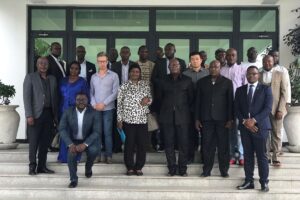On May 24th, 2023, the Zoological Society of London (ZSL) in collaboration with national partner Centre d`Appui a la Gestion Durable des Foret (CAGDF) convened the second Forest Governance Forum in Brazzaville, the Republic of Congo. This one-day workshop attracted a diverse range of stakeholders from the timber sector, including representatives from private industry, civil society, international NGOs, and forestry administration authorities.

The primary focus of the forum was the promotion of improved forest governance through the use of ZSL’s Sustainability, Policy, and Transparency Toolkit (SPOTT). This innovative tool annually tracks, assesses, ranks, and publishes the Environmental, Social, and Governance (ESG) performances of actors involved in the soft commodity supply chain. SPOTT’s scope spans across three commodities: Timber and Pulp, Natural Rubber, and Palm Oil, providing crucial information about the risks associated with the production of these goods.
The forum served as an important platform for attendees to understand the comprehensive suite of SPOTT resources and the importance of transparency in their operations. They were educated on how ZSL could support their efforts to enhance transparency, reduce reputational risk, and improve due diligence.
In-depth presentations covered the SPOTT indicator framework, which addresses core sustainability issues such as gender equality, climate change, rights, and biodiversity. These are pressing environmental and social concerns both locally and globally. Participants also received hands-on training on how to use the ‘Probench’ assessment platform and were briefed on the provisional results of the first batch of 2023 assessments.
The forum further explored topics like the economic benefits of sustainability, wildlife management in forest concessions, and the implementation status of annexe X of the Republic of Congo’s VPA-FLEGT. In addition, other transparency tools like the Open Timber Portal (OTP) of the World Resource Institute (WRI) were introduced, and attendees had the opportunity to exchange experiences on the market appreciation of certification.
This gathering was a part of a wider pre-assessment engagement process for the Congo Basin, a journey that began with one-on-one meetings in Cameroon and Gabon with forestry sector operators.
